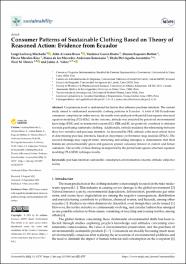Mostrar el registro sencillo del ítem
Consumer Patterns of Sustainable Clothing Based on Theory of Reasoned Action: Evidence from Ecuador
| dc.contributor.author | Leclercq-Machado, Luigi | es_ES |
| dc.contributor.author | Alvarez-Risco, Aldo | es_ES |
| dc.contributor.author | García-Ibarra, Verónica | es_ES |
| dc.contributor.author | Esquerre-Botton, Sharon | es_ES |
| dc.contributor.author | Morales-Ríos, Flavio | es_ES |
| dc.contributor.author | Anderson-Seminario, Maria de las Mercedes | es_ES |
| dc.contributor.author | Del-Aguila-Arcentales, Shyla | es_ES |
| dc.contributor.author | Davies, Neal M. | es_ES |
| dc.contributor.author | Yáñez, Jaime A. | es_ES |
| dc.date.accessioned | 2023-02-21T13:57:30Z | |
| dc.date.available | 2023-02-21T13:57:30Z | |
| dc.date.issued | 2022-11-09 | |
| dc.identifier.uri | https://hdl.handle.net/20.500.13053/7822 | |
| dc.description.abstract | Corporations need to understand the factors that influence purchase intention. The current study aimed to understand sustainable clothing patterns in Ecuador. A total of 343 Ecuadorian consumers completed an online survey; the results were analyzed with partial least squares structural equation modeling (PLS-SEM). As the outcome, attitude was predicted by perceived environmental knowledge (PEK) and environmental concern (EC). PEK and EC are positively correlated to attitudes towards purchasing sustainable clothing. Additionally, attitude mediated the relationship between these two variables and purchase intention. As measured by PEK, attitude is the most critical factor in determining purchase intention, based on importance performance map analysis (IPMA). The research findings may support firms’ marketing and selling strategies to demonstrate that their brands are environmentally green and generate greater consumer interest in current and future customers. The novelty of these findings is supported by the partial least squares structural equation modeling (PLS-SEM) technique results. | es_ES |
| dc.format | application/pdf | es_ES |
| dc.language.iso | eng | es_ES |
| dc.publisher | Sustainability (Switzerland) | es_ES |
| dc.rights | info:eu-repo/semantics/openAccess | es_ES |
| dc.rights.uri | https://creativecommons.org/licenses/by/4.0/ | es_ES |
| dc.subject | purchase intention; sustainable consumption; environmental concerns; attitude; subjective norms | es_ES |
| dc.title | Consumer Patterns of Sustainable Clothing Based on Theory of Reasoned Action: Evidence from Ecuador | es_ES |
| dc.type | info:eu-repo/semantics/article | es_ES |
| dc.identifier.doi | https://doi.org/10.3390/su142214737 | es_ES |
| dc.type.version | info:eu-repo/semantics/publishedVersion | es_ES |
| dc.publisher.country | CH | es_ES |
| dc.subject.ocde | http://purl.org/pe-repo/ocde/ford#3.03.00 | es_ES |
Ficheros en el ítem
Este ítem aparece en la(s) siguiente(s) colección(es)
-
Web of Science (WOS) [236]


